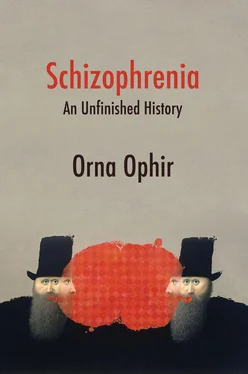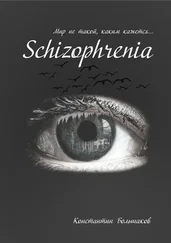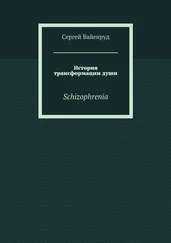During the late 1990s, when the older cohort of dynamic psychiatrists was replaced by the younger generation of biologically oriented medical professionals, psychoanalytically informed discussions were gradually phased out, while studies on drugs and somatic psychiatry were more and more prevalent. This is when I witnessed how lethal serious mental illnesses could be: Mr. G., who was new to the ward and only 23 years old, was found hanged inside the greenhouse on the hospital grounds. Mr. Y., who was 35 years old, refused to consume the medications he was offered, and his treatment at the hospital was terminated. He hanged himself in his apartment, leaving a note explaining that he would be reborn and delivered by his real father, the Lord. Mr. S., who was 21 years old, was released from the ward after recovering from an acute catatonic state. He stopped taking his medication since he felt it “killed” his ability to write music and became very laconic in his psychotherapy follow-up sessions. He went missing, and on a frigid winter day, after 12 days of a major search for him, was found dead in a river, far away from where he started his aimless walk. Mr. J., who was 42 years old, set himself on fire in a car, after a young lawyer, an advocate of patients’ rights, managed to release him from an involuntary hospitalization. And, finally, Ms. A., a 27-year-old woman, who believed that she was responsible for the mass extinction of whales in the Indian Ocean, was found dead in the Judean desert, after she missed her appointment with an intern psychologist who had diagnosed her as extremely dangerous to herself, based on a battery of projective psychological tests. Orlean, to conclude this sad, long, yet far from complete list, died a few years ago from a complication related to her smoking and the antipsychotic medication she had consumed for years. She was 47 years old.
While continuing to work at the hospital with patients and their families, I went back to graduate school, this time to study the history of my field. More specifically, my interests focused on the shift I experienced firsthand in our thinking, theorizing, and treatment of patients we mostly diagnosed as “schizophrenics.” I joined the Cohn Institute for the History and Philosophy of Science and Ideas at Tel Aviv University, where I wrote my first book about the history of psychoanalysis, psychiatry, and psychosis in postwar United States. I also founded the Israeli chapter of ISPS, whose acronym at that time stood for the International Society for the Psychological Treatments of the Schizophrenias and other Psychoses. The name was a mouthful, but aptly defined the work of mental health professionals who were deeply committed to following the psychoanalytic idea of finding meaning in patients’ symptoms, not least by establishing a working relationship with them. Our local branch organized conferences in collaboration with the Sigmund Freud Center at the Hebrew University in Jerusalem, with the Israeli Psychoanalytic Society, and with psychiatric hospitals both in Israel and around the world.
As the 2009 international conference of ISPS in Copenhagen started to take shape, a discussion among members called for the removal of the term “schizophrenia” from the association’s name, given the stigma it both carried and imposed. Based not least on the failure to validate schizophrenia as a distinct disease entity, 1efforts to abolish its label and nomenclature mushroomed. Suggestions such as “bury the ‘schizophrenia’ construct,” “abandon the concept of schizophrenia,” “abolish schizophrenia,” etc., indicated the direction that the association was about to take.
In anticipation of the upcoming publication of the DSM-5, the fifth edition of the Diagnostic and Statistical Manual of Mental Disorders , the ISPS leadership tried to press a change that would go beyond its own name and might influence the decision makers of the latest installment of what came to be known as psychiatry’s “Bible.” Experts argued that schizophrenia was “an idea whose very essence is equivocal,” a “category without natural boundaries, a barren hypothesis.” They condemned it for being “yesterday’s diagnosis,” 2“a construct with little reliability or predictive validity,” precisely because the symptoms used to diagnose it can be understood as extreme versions of normal human experience. 3Among others, these examples were a source of inspiration for the drive to rename.
It was further suggested that the Japanese term for “integration disorder” that had replaced the word “schizophrenia,” offered one example of a name change that was greatly preferred by both patients and caregivers. Yet others claimed that it was not just the name, but the whole nosological enterprise, the attempt to classify so-called psychiatric diseases, that had to be drastically reformed. To do so, it was argued, it would be helpful to introduce a dimensional approach that would jettison the earlier – metaphysical and modern – model, which was based on the increasingly untenable assumption of discrete categories or disease entities. The dimensional model, it was believed, would be compatible with empirical evidence that psychotic symptoms occur on a continuous spectrum that ranges from normality, on one end, to severe mental illness (SMI), on the other. Some also called for a hybrid system that would combine the advantages of the categorical system that was associated with known treatment outcomes, on the one hand, and the new dimensional approach that was deemed to have greater explanatory power, on the other. 4
And then, a further group argued that while the current diagnostic criteria for schizophrenia were admittedly “arbitrary and pseudo-scientific,” Bleuler’s original concept of “schizophrenia” was still quite valuable, as it could offer “a much broader, dynamic, phenomenological-oriented approach to understanding the schizophrenic patient.” 5Even those who remained intent on renaming the diagnosis searched for a term that would do “adequate justice to the alteration in the person’s [i.e., the patient’s] relationship with reality.” 6
At the “renaming” conference, the initial idea for my own contributing paper was to present a reasoned challenge to all these various efforts to discard the term schizophrenia. Initially, I thought I might take my lead from the gay rights movement, which by co-opting the originally derogatory term “queer” and transforming it into a positive self-label, had, in fact, succeeded in disarming hordes of homophobes. Others, notably in the fields of feminism, queer theory, and postcolonial theory, spoke of the critical need for “strategic essentialism,” a term coined by Gayatri Chakravorty Spivak to describe the political tactic, employed by a minority group that shares an identity in the public sphere, to struggle for its equal rights. In other words, even if schizophrenia as an essence was obsolete, using the term as a means to a different end was potentially more useful than putting an end to the very concept, then and there.
However, I was not fully convinced that the comparison with other minorities would hold up when it came to “schizophrenia.” Although “Mad Pride” activists called for reclaiming terms such as “mad” or “psycho,” I never met a suffering patient in real life who proudly adopted the “schizophrenic” label as a badge of honor, much less as a strategic, discursive advantage. Given my reservations, I came up with an alternative proposal, as I had noticed that – together with the call to discard the term schizophrenia – the word “psychoanalysis” had already gone missing from the announced program of the aforementioned congress in Copenhagen. Yet psychoanalysis was the very foundation on which ISPS was established in 1956, when Gaetano Benedetti and Christian Müller cofounded what was then called the International Symposium for the Psychotherapy of Schizophrenia (ISPS), whose first gathering took place at the psychiatric clinic of the University of Lausanne in Switzerland. Dissatisfied with the reductionist orientation of European psychiatry at the time, they sought the aid of psychoanalysis to find a deeper, more comprehensive approach to the medical theorization, clinical diagnosis, and treatment of the so-called schizophrenias. Even if psychoanalysis was not interested in diagnostic categories, and even though the name “schizophrenia” was a term Sigmund Freud, in particular, neither liked nor approved of, psychoanalysis offered an approach that helped understand the symptoms of schizophrenia as meaningful and, indeed, saw in their further exploration a possible path for insight and growth (as the psychoanalyst Ann-Louise Silver, the founder of the American chapter of the ISPS, asserted in this same context). Just as importantly, the premises and method of psychoanalysis allowed for a radically different way of envisioning the putative difference between the states of mental health, on the one hand, and those of serious mental illness, on the other.
Читать дальше












